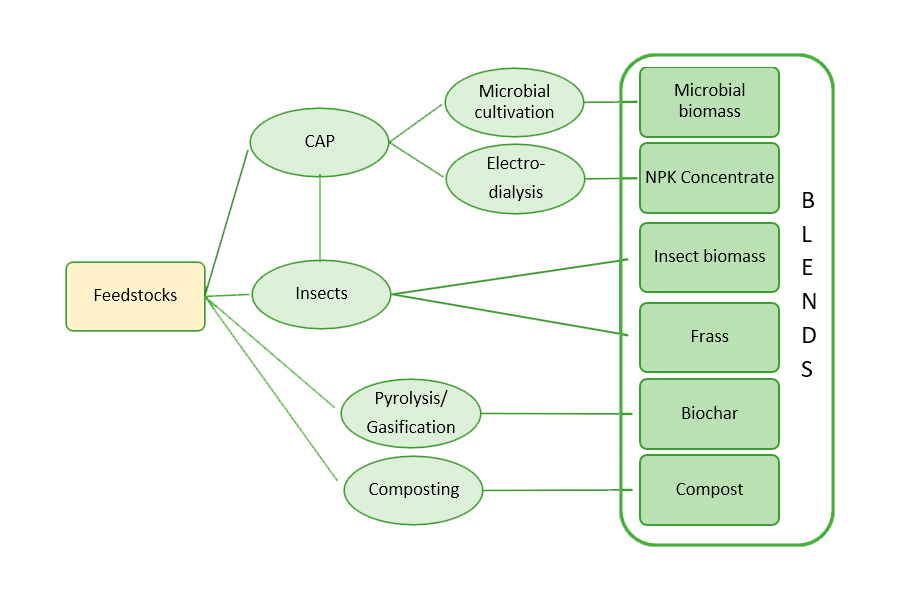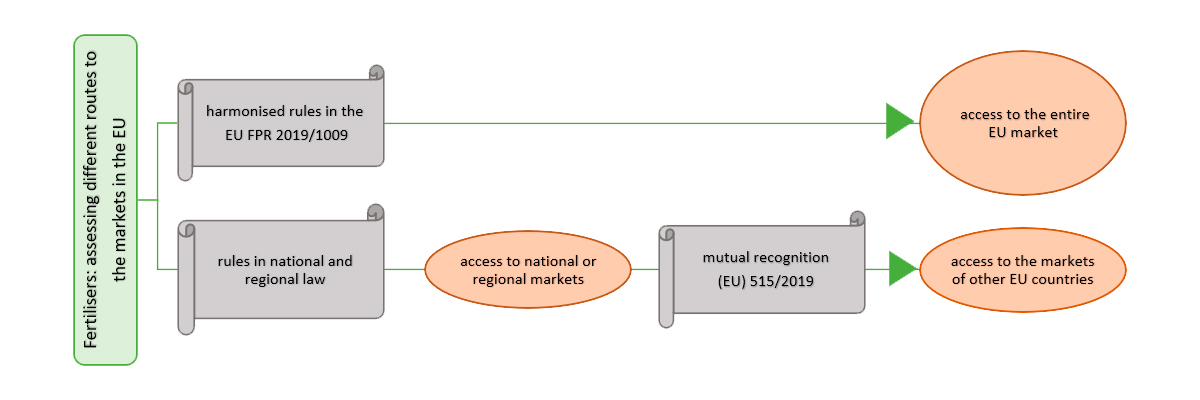By using five core technologies plus generating compost and achieving six building blocks and various blends (Figure 1), a multitude of policies and legal subjects applies.
Feedstocks
Innovations and value chains of RUSTICA are based on leavings and side streams of food production starting from the primary sector over processing to distribution and retail. Waste legislation in the EU comprehensively addresses such leftovers. The amended Waste Framework Directive 2008/98/EC (WFD) defines “waste” and criteria have to be met if this status should be changed into “End-of-waste”. In addition, terms of by-products not falling under the definition of waste and corresponding provisions are laid down in the WFD. As such, the type of feedstock plays a decisive role for the subsequent measures, processes, products and their use.
Five core technologies and compost
If the leftovers from agriculture and the food chain are fed into the Carboxylic Acid Platform (CAP), and subsequently processed by electrodialysis or microbial cultivation, the stipulations of the REACH regulation need to be considered. If the feedstock is valorized via pyrolysis, attention should be paid to this legal source as well, while e.g., for composting both: law on waste and products can be relevant. Furthermore, rearing of insects, which count for farmed animals in the EU, is subject to research in RUSTICA. Therefore, legislation on feed needs to be abide by one cultivating farmed insects in the EU. Instructions on treatment and marketing for fertiliser purposes lead directly to the Animal by-products regulations and further legal sources in the EU.
Six building blocks and blends
As regards legislation on fertilisers, RUSTICA developments by means of building blocks and blends can either be assessed on their suitability for marketing under harmonized rules of the amended EU Fertilising Products Regulation (EU) 2019/1009 (FPR) or under non-harmonised national/regional legal and political regimes in the EU (Figure 2). Debating the former, e.g., options and constraints for nutrient concentrate, biochar, compost, insect protein/-frass (to date mainly in the context of compost) and blends can be evaluated in the FPR and legal sources relating thereto.
Deliberating national and regional law on fertilisers in the test case regions Almeria, Flanders, Friuli Venezia Giulia, and Pays de la Loire reveals very heterogeneous legal frameworks throughout Europe. Marketing of compost is often determined by standards (e.g., in France). Unlike other RUSTICA test case regions at the moment, biochar is ruled by national Italian law in Friuli Venezia Giulia. Various national legal stipulations mainly dictating certain processing methods and minimum contents of macro- and micronutrients can be found on liquid inorganic nutrient concentrates whereas concrete remarks on “bio-based inorganic fertilisers” are still missing. Certain avenues are already built for insect materials at national level provided that the detailed prescriptions of the EU Animal by-products Regulations are met. According to RUSTICA microbial biomass, specific terms apply for test purposes. Since marketing of “bio-based fertiliser blends” lacks general rules in national and regional law in the RUSTICA EU test case countries, the legal environment needs to be studied for the individual blend composition.
To be deployed for the purpose of organic production in the EU, legally enshrined instructions, e.g., in Regulation (EU)2018/848 and implementing acts need to be complied with. For example, settings can be found for compost, biochar and frass and requested treatments which are, as such, pivotal for the RUSTICA project and the impact of its value chains if the organic sector is targeted in the EU.
30.11.2024
Adelheid Wiedemann
Wiedemann GmbH, Germany
www.wiedemann-gmbh.eu
Disclaimer: The views presented in this publication RUSTICA value chains in the mirror of various legal and political environments are solely an opinion of the author. The author and the RUSTICA consortium members do not accept any liability for direct or indirect consequences, losses or damages resulting from the use of this publication, its content or parts of it. This document is exclusively prepared for general information purposes and represents in no kind a legal or any other advice.



